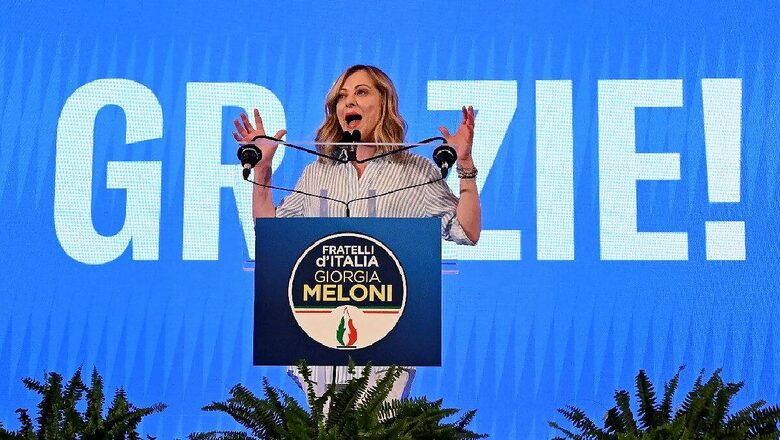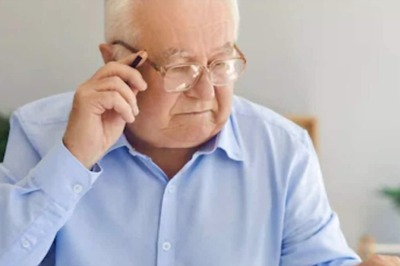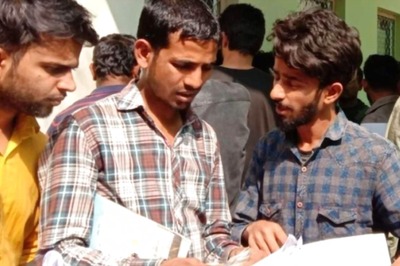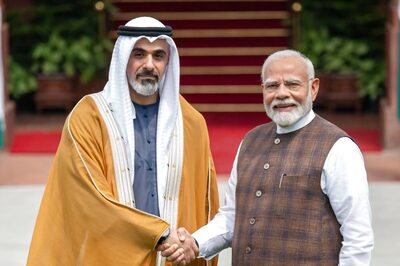
views
Giorgia Meloni and her far-right, post-fascist Brothers of Italy party won decisively in the European elections in Italy, as per unofficial results released Monday, and ensured that she was among the few EU leaders to emerge stronger after the vote.
GRAZIE! @FratellidItalia si conferma primo partito italiano, superando il risultato delle scorse elezioni politiche. pic.twitter.com/uYHHm4Nm6S— Giorgia Meloni (@GiorgiaMeloni) June 9, 2024
“Thank you!” the Italian prime minister posted on social media alongside a photo of her making a V-for victory.
The Brothers of Italy victory in the elections ended up boosting her standing both at home and abroad. It secured 28.82% of the vote Monday with 97% of all votes counted — surpassing the 26% she secured in September 2022 national elections.
Italy Italian Prime Minister Giorgia Meloni's conservative party is set to win the most seats in Italy, beating the center-left opposition according to exit polls.
– another far-right win pic.twitter.com/FDPlxAGJoZ
— Russian Market (@runews) June 9, 2024
The right-wing leader had urged voters to write “Giorgia” on their ballots and said the elections would be a referendum on her leadership.
“I am proud that this nation presents itself at the G7 and in Europe with the strongest government of all,” Meloni, who in a few days will host G7 leaders in Puglia, said. She added that she was “extraordinarily proud” of the result.
Meloni has emerged as one of the ‘kingmakers’ following the elections and has appeared to keep her cards close to her chest.
“The results weren’t at all given, it is a resounding achievement and shows that all the parties of the majority have been able to grow together,” Meloni said later in the morning on RTL 102.5 Radio.
She said, however, it was still too early to say whether she would back a second term for centre-right European Commission President Ursula von der Leyen.
Meloni has been actively courted both by the centre-right von der Leyen — and by French far-right leader Marine Le Pen, who wants to create a right-wing EU supergroup. However, one EU diplomat speaking to French news agency AFP said that she should not be seen as a ‘kingmaker’.
“”Meloni will have an influence on Italian interests, at the commission, in parliament. She will play the game. But does that make her a kingmaker? No,” said the diplomat, who asked not to be named.
She campaigned on a promise to restore Italy’s national pride and boost the economy, protect the country’s Christian culture and traditional family values, and reduce illegal immigration.
“I want the EU to change. We’re too open. We should be more critical as to who we let in because it costs a lot of money,” 48-year-old government worker Simone Nieuwenhuys told AFP after casting her ballot.
“What we need is a Europe that will listen to citizens, that will look more to the centre-right and has more pragmatic and less ideological policies,” Meloni said.
Experts speaking to the Associated Press said that Meloni has emerged stronger after elections and said it is important to note that her government has not lost consensus. “I think that Meloni gets out of these elections stronger, first of all because this is a government that has not lost consensus, which is quite unique in Europe. Secondly, with the growth of far-right parties, Meloni is in a pivotal position between the far right and the European People’s Party,” Giovanni Orsina, director of the school of government at LUISS university in Rome said.
It also remains unclear whether she will work with the likes of French right-wing leader Marine Le Pen as there are tensions between her and Le Pen, who sit in different groupings in the European Parliament.
“I don’t think Meloni wants to go back to working with the likes of Le Pen. She will have fewer MEPs than Le Pen, but she is prime minister. I think she will keep trying now to play the game with the big guys and focus on the EPP,” said Daniele Albertazzi, co-director at the Centre for Britain and Europe think tank, while speaking to AFP.
It should also be noted that Meloni has also moderated her image on the international stage, dropping her previous anti-EU rhetoric and presenting herself as a bridge between the mainstream centre-right and her own national conservative camp, which was previously shunned.




















Comments
0 comment